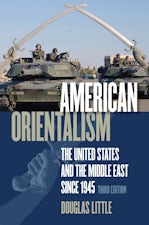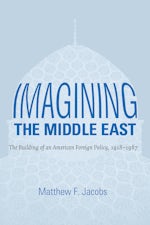Us versus Them, Second Edition
The United States, Radical Islam, and the Rise of the Green Threat
Second Edition
By Douglas Little
with a new afterword by the author
356 pp., 6.125 x 9.25, 4 maps
-
Paperback ISBN: 978-1-4696-6952-6
Published: September 2022 -
E-book EPUB ISBN: 978-1-4696-7062-1
Published: August 2022 -
E-book PDF ISBN: 979-8-8908-6378-2
Published: August 2022
Buy this Book
- Paperback $27.95
- E-Book $22.99
For Professors:
Free E-Exam Copies
About the Author
Douglas Little is professor of history at Clark University. He is author of American Orientalism: The United States and the Middle East since 1945.
For more information about Douglas Little, visit
the
Author
Page.
Reviews
"Little demonstrates the value of professional historical research for what have become politicized, even polemical, debates over America's confrontation with Islamists and offers the best available account of post-9/11 U.S. foreign policy."—American Historical Review
"A major contribution to historical scholarship on the subject, one that will fascinate, enlighten, provoke, and at times delight readers of all levels and persuasions."--Salim Yaqub, author of Imperfect Strangers: Americans, Arabs, and U.S.-Middle East Relations in the 1970s
“Little demonstrates the value of professional historical research for what have become politicized, even polemical, debates over America’s confrontation with Islamists and offers the best available account of post-9/11 U.S. foreign policy.”—American Historical Review



